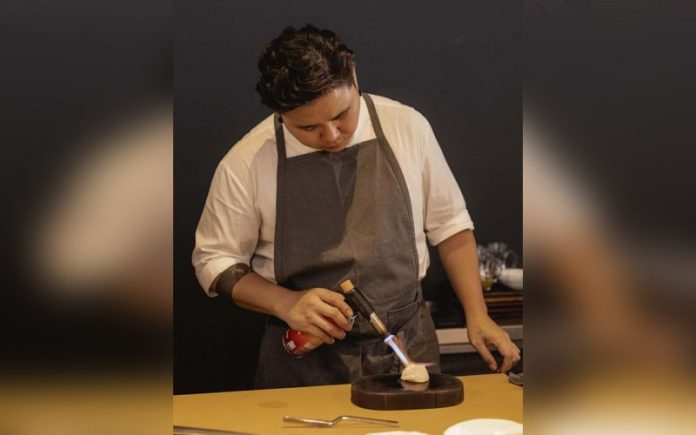Jack Weldie is a self-taught East Malaysian chef who serves up a quintessentially Japanese curated dining experience at Chipta 11A in Petaling Jaya.
The name of the establishment originates from the Malay word for “create”. Served Omakase-style, where dishes are selected by the chef himself, Chipta 11A opened in December 2019, just before the pandemic hit.
Weldie is of the Dusun tribe, one of the largest ethnic groups in Kota Kinabalu. His first exposure to restaurant work was with a Chinese banquet-catering company at the age of 17.
“I would be on my feet for 16 hours or more, deboning 200 chickens and peeling 60kg of prawns everyday,” he recalled. “I quit within a month.”
A friend introduced him to work for a Japanese restaurant as a front-of-house service staff, but he soon found himself in the kitchen again as there was a worker shortage.
Not understanding a word of Japanese and struggling with English, he had to deal with his fair share of bullying from an unfriendly crew, which drove him to work doubly hard to prove himself.
In his mid-20s, Weldie joined a Kaiseki, or traditional multi-course, Japanese restaurant, and learnt from the chefs there how to care for ingredients and maintain good relations with suppliers.
In 2011, he was appointed head chef of the restaurant and learnt the Omakase method from a mentor.
Weldie began experimenting by pairing local fish with other food, or treating it in new ways – for instance, by reducing the fishiness of ikan kembung through dry-ageing. These innovations would pave the way for him to launch Chipta 11A less than a decade later.
“It is in my nature to think about food all the time,” he said. “How do we create food that goes beyond just simply consuming it? How do we evoke emotions with something unfamiliar and yet familiar?”
Thus, Chipta 11A has become a platform for invention where Weldie has the freedom to express himself and find his identity.
The menu is an expression of food that reflects who he is: someone with skills and experience in Japanese cookery, who also has a love for local flavours and East Malaysian heritage.
“I used to work in my extended family’s paddy fields during my school break,” he told Set The Tables. “An arduous journey of 30 minutes on foot from home, my grandmother would forage the forest and paddy fields along the way, plucking seemingly random wild greens from the lush greenery.
“I never paid much attention to the whole process then, though I wished I had. At the end of the journey, she would set up a fire and combine the wild greens with belacan, mackerel, and local spices, cooking it the ‘agak-agak’ (guestimation) way. Those are my fondest memories of food.”
Weldie also sheds some insights on two fascinating items on his menu.
Tamarind ‘shari’
“We tried serving traditional ‘shari’, or sushi rice, but something was not quite right. I wanted to cook something that made sense to me, which led to tamarind shari.
“The rice does not appear in the conventional pearly white, but an earthy brown because we use asam jawa instead of vinegar. The result is a complex medley of sweet and sour, eliminating the need for a soy dipping sauce.”
Seafood and sengkuang
“It is significant to showcase how common items can stand on par with premium ingredients – for instance, by pairing the humble sengkuang (jicama) with fresh Hokkaido scallops” – an intricate balance of the indigenous and the exotic.
For more information on Chipta 11A, visit its website, as well as Instagram and Facebook profiles.
Chipta 11A Curated Dining
11a, Jalan 20/16, Sea Park,
46300 Petaling Jaya, Selangor
This article was written by Theri Burhan for Set the Tables. Set the Tables is positioned to inspire and educate those in the industry as well as the aspiring reader who dreams of a future in the food business, and maybe even the merely curious tantalised by the vast and irresistible universe of food and drink. Follow them on Instagram.
Local news app Lumi News covers the top stories from leading news sites, including Free Malaysia Today, on a daily basis.
They say it will help protect the interests and safety of consumers.
Fostering growth and success in local sellers fuels the engine of Malaysia’s digital economy.
Investment in the renewable energy sector will improve as consumer demand increases for green energy.






